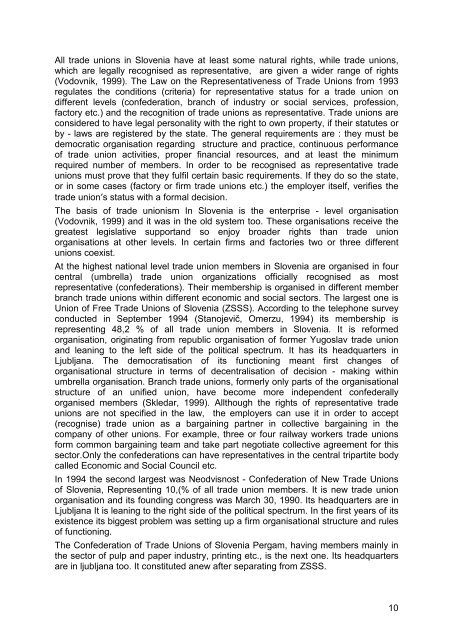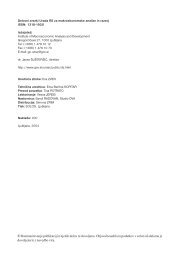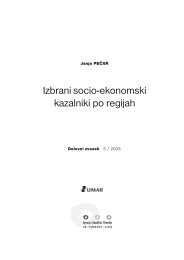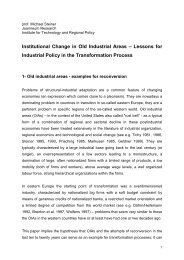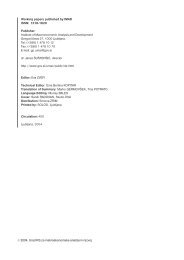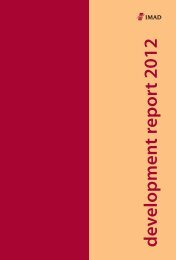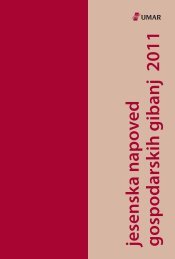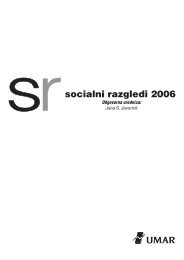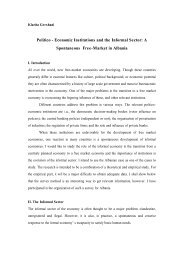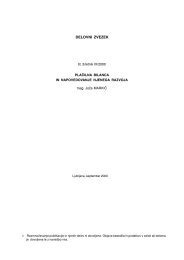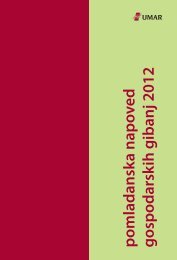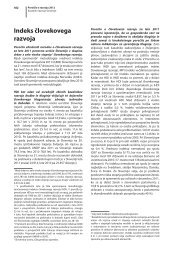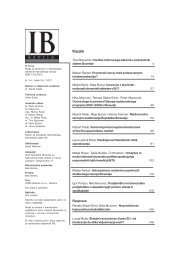The Development of New Industrial Relations in Slovenia - UMAR
The Development of New Industrial Relations in Slovenia - UMAR
The Development of New Industrial Relations in Slovenia - UMAR
Create successful ePaper yourself
Turn your PDF publications into a flip-book with our unique Google optimized e-Paper software.
All trade unions <strong>in</strong> <strong>Slovenia</strong> have at least some natural rights, while trade unions,<br />
which are legally recognised as representative, are given a wider range <strong>of</strong> rights<br />
(Vodovnik, 1999). <strong>The</strong> Law on the Representativeness <strong>of</strong> Trade Unions from 1993<br />
regulates the conditions (criteria) for representative status for a trade union on<br />
different levels (confederation, branch <strong>of</strong> <strong>in</strong>dustry or social services, pr<strong>of</strong>ession,<br />
factory etc.) and the recognition <strong>of</strong> trade unions as representative. Trade unions are<br />
considered to have legal personality with the right to own property, if their statutes or<br />
by - laws are registered by the state. <strong>The</strong> general requirements are : they must be<br />
democratic organisation regard<strong>in</strong>g structure and practice, cont<strong>in</strong>uous performance<br />
<strong>of</strong> trade union activities, proper f<strong>in</strong>ancial resources, and at least the m<strong>in</strong>imum<br />
required number <strong>of</strong> members. In order to be recognised as representative trade<br />
unions must prove that they fulfil certa<strong>in</strong> basic requirements. If they do so the state,<br />
or <strong>in</strong> some cases (factory or firm trade unions etc.) the employer itself, verifies the<br />
trade union′s status with a formal decision.<br />
<strong>The</strong> basis <strong>of</strong> trade unionism In <strong>Slovenia</strong> is the enterprise - level organisation<br />
(Vodovnik, 1999) and it was <strong>in</strong> the old system too. <strong>The</strong>se organisations receive the<br />
greatest legislative supportand so enjoy broader rights than trade union<br />
organisations at other levels. In certa<strong>in</strong> firms and factories two or three different<br />
unions coexist.<br />
At the highest national level trade union members <strong>in</strong> <strong>Slovenia</strong> are organised <strong>in</strong> four<br />
central (umbrella) trade union organizations <strong>of</strong>ficially recognised as most<br />
representative (confederations). <strong>The</strong>ir membership is organised <strong>in</strong> different member<br />
branch trade unions with<strong>in</strong> different economic and social sectors. <strong>The</strong> largest one is<br />
Union <strong>of</strong> Free Trade Unions <strong>of</strong> <strong>Slovenia</strong> (ZSSS). Accord<strong>in</strong>g to the telephone survey<br />
conducted <strong>in</strong> September 1994 (Stanojevič, Omerzu, 1994) its membership is<br />
represent<strong>in</strong>g 48,2 % <strong>of</strong> all trade union members <strong>in</strong> <strong>Slovenia</strong>. It is reformed<br />
organisation, orig<strong>in</strong>at<strong>in</strong>g from republic organisation <strong>of</strong> former Yugoslav trade union<br />
and lean<strong>in</strong>g to the left side <strong>of</strong> the political spectrum. It has its headquarters <strong>in</strong><br />
Ljubljana. <strong>The</strong> democratisation <strong>of</strong> its function<strong>in</strong>g meant first changes <strong>of</strong><br />
organisational structure <strong>in</strong> terms <strong>of</strong> decentralisation <strong>of</strong> decision - mak<strong>in</strong>g with<strong>in</strong><br />
umbrella organisation. Branch trade unions, formerly only parts <strong>of</strong> the organisational<br />
structure <strong>of</strong> an unified union, have become more <strong>in</strong>dependent confederally<br />
organised members (Skledar, 1999). Allthough the rights <strong>of</strong> representative trade<br />
unions are not specified <strong>in</strong> the law, the employers can use it <strong>in</strong> order to accept<br />
(recognise) trade union as a barga<strong>in</strong><strong>in</strong>g partner <strong>in</strong> collective barga<strong>in</strong><strong>in</strong>g <strong>in</strong> the<br />
company <strong>of</strong> other unions. For example, three or four railway workers trade unions<br />
form common barga<strong>in</strong><strong>in</strong>g team and take part negotiate collective agreement for this<br />
sector.Only the confederations can have representatives <strong>in</strong> the central tripartite body<br />
called Economic and Social Council etc.<br />
In 1994 the second largest was Neodvisnost - Confederation <strong>of</strong> <strong>New</strong> Trade Unions<br />
<strong>of</strong> <strong>Slovenia</strong>, Represent<strong>in</strong>g 10,(% <strong>of</strong> all trade union members. It is new trade union<br />
organisation and its found<strong>in</strong>g congress was March 30, 1990. Its headquarters are <strong>in</strong><br />
Ljubljana It is lean<strong>in</strong>g to the right side <strong>of</strong> the political spectrum. In the first years <strong>of</strong> its<br />
existence its biggest problem was sett<strong>in</strong>g up a firm organisational structure and rules<br />
<strong>of</strong> function<strong>in</strong>g.<br />
<strong>The</strong> Confederation <strong>of</strong> Trade Unions <strong>of</strong> <strong>Slovenia</strong> Pergam, hav<strong>in</strong>g members ma<strong>in</strong>ly <strong>in</strong><br />
the sector <strong>of</strong> pulp and paper <strong>in</strong>dustry, pr<strong>in</strong>t<strong>in</strong>g etc., is the next one. Its headquarters<br />
are <strong>in</strong> ljubljana too. It constituted anew after separat<strong>in</strong>g from ZSSS.<br />
10


